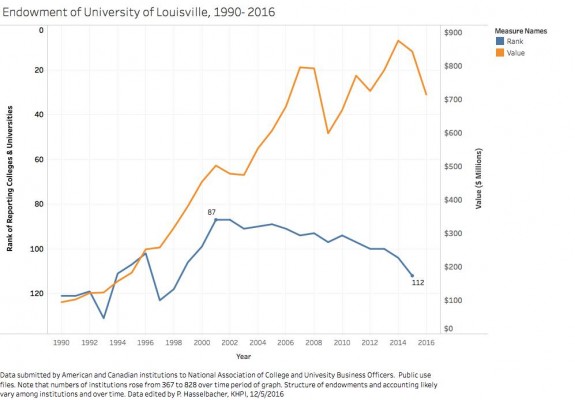A lot happened today at the Executive Committee meeting of the UofL Board of Trustees. I was unable to attend. It is being reported that UofL and KentuckyOne Health are dissolving the Joint Operating Agreement under which KentuckyOne managed most of the clinical activities of University of Louisville Hospital. I do not yet have access to the details of the dissolution process which had a myriad of contractural agreements to settle including penalties and non-compete clauses. I hope to be able to provide an analysis in coming days. Much may be revealed in the fine print, including why KentuckyOne will continue to put money into University Hospital. The two entities have agreed to prepare new Academic Affiliation Agreements that would allow UofL faculty and trainees to interact at Jewish Hospital, and for Jewish Hospital to capture the financial, research, and reputational advantages of being a teaching hospital.
Another matter that was apparently dealt with at today’s meeting was the status of Dr. David Dunn, one of the principal architects of the agreements with CHI and KentuckyOne, but who has been on the sidelines for many months while he was being investigated by the FBI for possible misuse of federal money, To my knowledge, the status of that investigation has not been made public. Dr. Dunn has been being paid one of the very highest salaries in the University even though his contract has reportedly expired.
Today, the status of Dr. Dunn has apparently been settled. The University provided the statement below in response to my request for an update:
“The University of Louisville and Dr. David L. Dunn have reached an agreement related to his employment at the university. As of Dec. 12, 2016, Dr. Dunn is no longer an employee of the University of Louisville. Dr. Dunn leaves the university as a tenured, full professor in good standing. To compensate for his relinquishing his tenured position, Dr. Dunn will receive $1.15 million.”
Some have speculated that the Board has taken no action with respect to Dr. Dunn because it agreed not to take other than “routine” actions in a settlement of a lawsuit by a group of community ministers over the racial make-up of the Board. Perhaps no action was appropriate. The Board recently prefaces its retirement into executive session by declaring that it is for “routine” matters only. I must say that I felt uncomfortable with the optic earlier this month when the full Board terminated the tenure of an African-American faculty member. To that person, no matter what the merits of the situation, the termination action was hardly routine. I would argue that an agreement to deal only with routine or non-structural matters no matters longer holds any water and in fact has already been abandoned. That is as it should be! Dissolution of the Joint Operating Agreement is no more or less routine than granting degrees, approving a budget, hiring fiduciary auditors, granting or removing tenure, or for that matter, raising tuition. Perhaps there are legal niceties of language to be honored, but this Board is doing exactly exactly what needs to be done and must be allowed to do in an unfettered manner.
Peter Hasselbacher, MD
Emeritus Professor of Medicine, UofL
President, KHPI.
December 13, 2016

